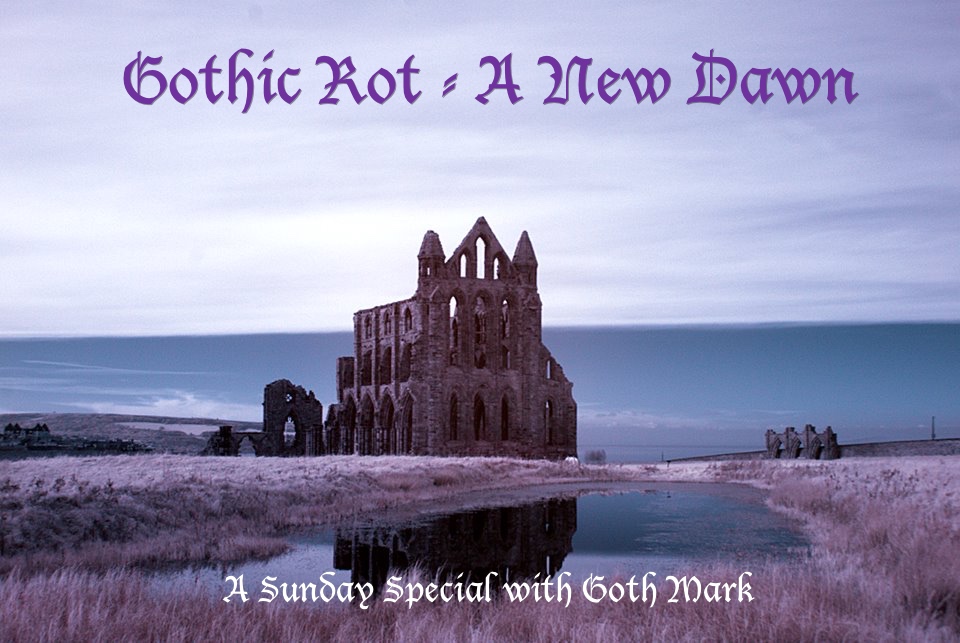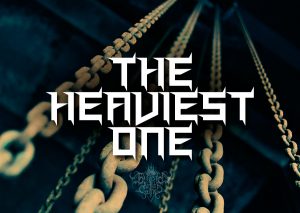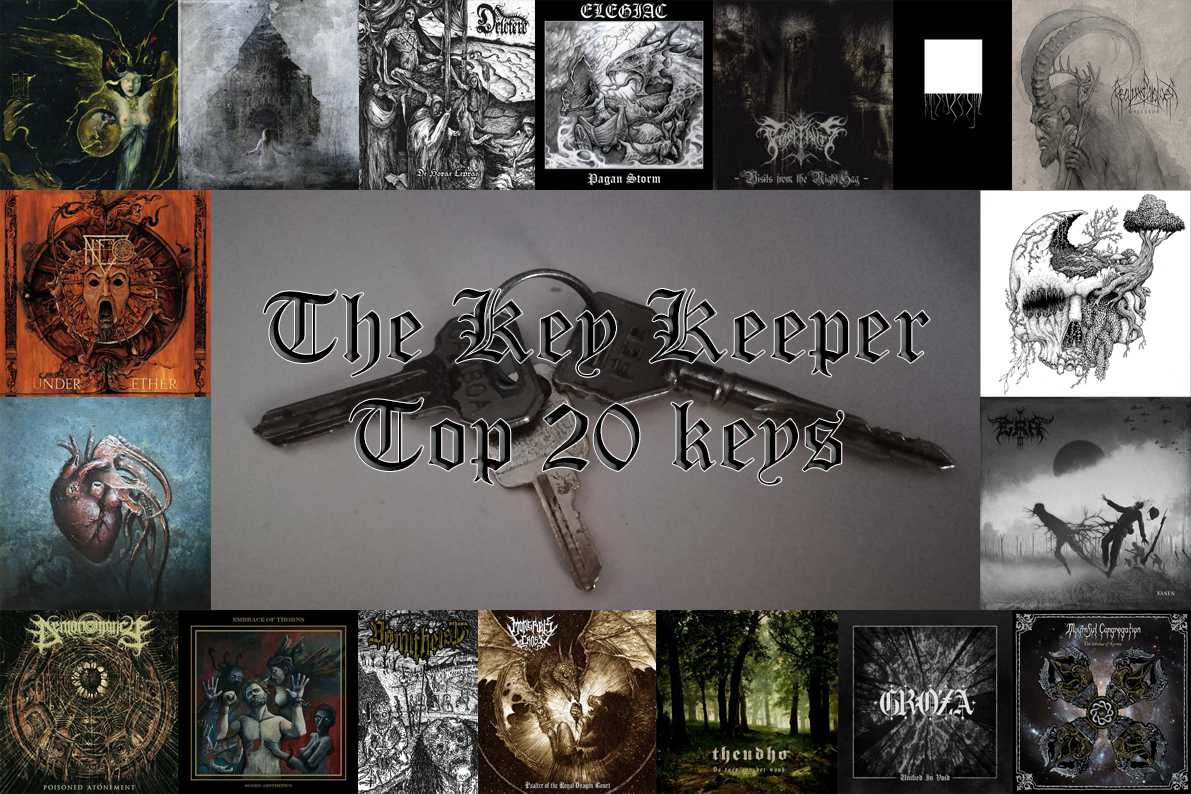The Gothic Rot: A New Dawn. A Sunday Special with Goth Mark

In the mid 1990s as a sixth form student, I was aware of what I assumed to be ‘Dark Indie Kids’. They wore far more black than the metalheads, keeping themselves to themselves; a group of 8 people versus triple the amount of metalheads. They seemed a decent bunch, some of them on the same courses as me – but I knew they weren’t into metal like the majority of the ‘alternative students’, or Britpop (Indie) scenes that exploded with popularity.
Fast forward to 1998. I was promoted in office work, where my first wage increase created a dilemma: Do I buy myself a Minidisc recorder, or a DAT machine? A fear of not going out (and missing out) for a couple of months resulted in purchasing the former for my hi-fi, where I relished the future of recording; perfect digital copies on physical media the size of a Post It Note was like technology that fell from an alien planet compared to a tape. I took a visit to the library and filled my boots with albums to copy, notably ‘Some Girls Wander By Mistake’ by The Sisters of Mercy. They made for an intriguing listen; an icy mysterious punk style, treble high guitars, prominent bass, drum machines, and baritone vocals. I enjoyed it but didn’t think too much about it, assuming that’s where ‘goth’ began and ended. At some point, I tracked down most of their EPs on vinyl.
Fast forward to 2008. I’m browsing through my fiancee’s album collection to discover a ‘Best Of’ by The Cure, Rosetta Stone, and albums by The Mission. I borrowed these albums from her, and decided to fill the gaps in my collection. Then I purchased ‘First and Last and Always’ and ‘Floodland’ – which were absolutely incredible along with The Mission’s ‘God’s Own Medicine’ and ‘Children’ albums respectively. A conversation struck up about attending a mysterious weekend in North Yorkshire called Whitby Goth Weekend; however, we could only make it on a day trip where we stopped over at Scarborough. In Spring 2009, we had our first Whitby Goth Weekend booked.
In the meantime, I joined the WGW forum to be sucked down an addictive online rabbit hole. Granted, there were squabbles due to a curious metalhead browsing their hallowed forum – but a few members were “Gothic Compatible” metalheads that became great friends of mine, along with “Trad Goths” (the ‘Dark Indie Kids’ mentioned earlier) willing to educate me and show me the ropes. I discovered the scene simply didn’t die with Sisters of Mercy disappearing from the mainstream in the early 90s – and weirder still – a sizeable bunch of people who despise metal, who grew up around the London areas where goth and metal nightclub goers didn’t mix, who got hassled by metalheads – whilst further north the distinction was blurred. This sounded absurd, seeing as we both like loud guitar music, look weird, like partying, and going to gigs with like minded people. I browsed the forum’s ‘Now Playing’ thread with avid interest, where I discovered podcasts from Martin Oldgoth, Dave Exile, and DJ Cruel Britannia who were (and still are) more than happy to point out recommendations. I discovered The Cure’s ‘Pornography’ album, and a bunch of bands that altered my music taste forever.
The ‘Gothic Rot’ had set in. Here are the bands that shaped it.
Band: THE DANSE SOCIETY
Origin: UK
Status: Complicated
One of the founding post punk bands, The Danse Society formed in 1980 and released their debut album ‘Seduction’ in 1982 to critical acclaim – resulted in them signing to Arista records who released their second album ‘Heaven Is Waiting’ in 1983. Large high profile European tours ensured with bands such as Xmal Deutschland and The Chameleons, that peaked with an an appearance at The Danceteria in New York. Sadly, after the release of ‘Looking Through’ in 1986, the original line up split a year later due to record label pressure and internal conflicts, whilst trying to force the band to become the next Simple Minds-esque chart toppers.
A reformation campaign via Facebook lead to most of the line up reforming in 2011, however vocalist Steve Rawlings recorded one track called ‘Towers’ and then returned back to America – expressing no further interest. Things became complicated when a new vocalist was recruited, and an acrimonious split resulted in half the band walking out to form their own version who lost a legal battle to keep the band name – resulting in eventually calling themselves The Society. Nowadays, the band that kept the rights to the name sound totally different with a darkwave/synthpop style, whilst the other incarnation sticks to the original post punk styles of their earlier material.
Irrespective of which ‘team’ you pick, the original incarnation featured swirling prog rock style synths and keyboards, bags of atmosphere, and incredible musicianship. All of this, topped with a crooning poster boy vocalist was the icing upon the gothic cake.
Stand out tracks: We’re So Happy, Clock, Danse Move, Heaven Is Waiting.
Band: XMAL DEUTSCHLAND
Origin: Germany
Status: Disbanded
At the top of the list of originators, Xmal Deutschland came from Hamburg, Germany – forming in 1980 to release the single ‘Schwarze Welt’ in 1981 and featured on the compilation album ‘Lieber Zuviel Als Zuwenig’ on ZickZak records. They released the scene classic ‘Incubus Succubus’ single in 1982, securing themselves as a support for the Cocteau Twins and their debut album ‘Fetisch’ which was released on the 4AD record label in 1983. Even though the band originally sung entirely in German, this didn’t deter British listeners which resulted in a Peel Sessions 4 track EP to critical acclaim.
A world tour ensured with the ‘Toscin’ album in 1984 and further exposure, resulting in a more stylised approach to their earlier and rawer material with the release of the ‘Viva’ album in 1987. Sadly, line up changes resulted in the band watering down their sound at this point – accumulating with the release of ‘Devils’ in 1989, which was a shadow of the bands former output. The group eventually split in 1990 after a handful of live appearances, closing the door on a highly revered scene originator.
Stand out tracks: Mondlicht, Incubus Succubus, Polarlict, Qual
Band: CLAN OF XYMOS
Origin: Holland
Status: Active
Originating from the town of Nijmegen, Clan of Xymox is a project born from Ronny Moorings and Anka Wolbert that formed in 1981 who moved to Holland and recruited Frank Weyzig and Pieter Nooten, culminating in the mini EP ‘Subsequent Pleasures’ in 1983. In 1985, they released their self titled debut album where they found themselves invited on a tour with Dead Can Dance in the UK, and signed to 4AD records. They have an expansive back catalogue of 16 albums where Ronnie Moorings became the sole originator due to a revolving group of band members; resulting in laying down the template for darkwave styles – a result formed from the cross pollination of Tubeway Army and Depeche Mode; mixed with the post punk styling of The Sisters of Mercy and Bauhaus. A prominent synth pop emphasis can be heard on albums such as ‘Twist of Shadows’ released in 1989, where they shortened their name to Xymox.
By the late 1990s they brought back their full name and a guitar prominent sound on their ‘Hidden Faces’ album, when industrial metal was on the rise fuelled by Rammstein and Nine Inch Nails releases respectively; nevertheless, they reverted back to synth heavy albums such as ‘Darkest Hour’. Clan of Xymox’s latter day works may be an acquired taste for the ‘Goth Curious’ metalhead, but their self titled debut is a worthy keystone to Goth music.
Stand out tracks: A Day, Medusa, Stranger, Consolation
Band: THE MARCH VIOLETS
Origin: UK
Status: On hold
The March Violets are another one of the original post punk/goth bands that helped in forming the scene, starting in 1981 in the city of Leeds. Interestingly, they come from the same city as The Sisters of Mercy and were an important cornerstone in the scene in the early 1980s – where Andrew Eldritch helped in the release of their ‘Religious As Hell’ EP and ‘Grooving in Green’ single in late 1982, via his Merciful Release record label. In a similar manner, they also released a slew of EPs and singles that are considered to be highly influential, notably with the goth dance floor classic ‘Snake Dance’. They release a compilation album in the form of ‘Natural History’, which includes tracks recorded during a Peel Sessions appearance. However, they shifted towards a more pop orientated sound (as prevalent in the song ‘Turn To The Sky’) resulting in original vocalist Simon Denbigh leaving in 1985 prior to a large American tour, to form the band Batfish Boys. The March Violets disbanded in 1987, with a final compilation called ‘The Botanic Verses’ released in 1993 – that helped to tie up the loose ends with their singles and EP releases.
In 2007 they played a reunion gig in Leeds with most of the original band members to critical acclaim, with plans for further tours in the pipeline; which were put on hold due to vocalist Rosie Garland undergoing successful throat cancer treatment in 2009. As a result of this, they played Whitby Goth Weekend in late 2010 – along with their first ever show in 25 years in London in the same year. They successfully used the Pledge Music platform to release their first proper studio album ‘Made Glorious’ and ‘Mortality’; that resulted in a small live tour and some American appearances – notably at Convergence, an event similar to Whitby Goth Weekend and Wave Gotik Treffen. In early 2016 Simon Denbigh suffered from a stroke, and its assumed that for now the band is on hiatus.
Stand out tracks: Snake Dance, Religious As Hell, Lights Go Out, Crow Baby
by Goth Mark
**Please support the underground! It’s vital to the future of our genre.
#WeAreBlessedAltarZine
#TheZineSupportingTheUnderground


